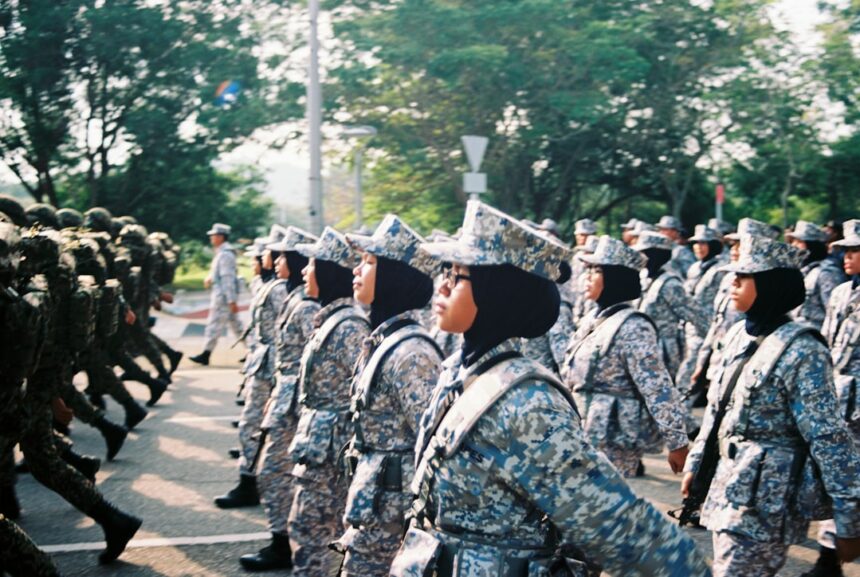Mercenary armies have long been a fascinating and contentious aspect of military history. These groups, composed of individuals who are primarily motivated by financial gain rather than national allegiance, have played pivotal roles in various conflicts throughout the ages. The concept of mercenaries is not a modern phenomenon; it has roots that stretch back to ancient civilizations.
In contemporary discussions, the term often evokes images of private military contractors operating in war-torn regions, raising questions about loyalty, legality, and morality. As the nature of warfare evolves, so too does the role of mercenary armies, prompting a closer examination of their implications for global security and international relations. The rise of mercenary forces in modern conflicts has sparked debates about their effectiveness and ethical standing.
While some argue that these armies provide necessary expertise and flexibility in combat situations, others contend that their motivations can lead to a lack of accountability and oversight. This article aims to explore the historical background of mercenary armies, the factors contributing to their rise, their role in modern warfare, and the controversies surrounding their use. Additionally, it will delve into the ethical implications of employing such forces and consider the future trajectory of mercenary armies in an increasingly complex global landscape.
Key Takeaways
- Mercenary armies have a long history and have played a significant role in warfare throughout the ages.
- Factors such as the decline of feudalism, the rise of nation-states, and the need for specialized military skills have contributed to the rise of mercenary armies.
- In modern warfare, mercenary armies have been utilized for tasks such as security, training, and combat support.
- The use of mercenary armies is controversial due to concerns about accountability, human rights abuses, and their impact on international relations.
- In the 21st century, mercenary armies continue to be employed in various conflicts, raising ethical and legal questions about their use.
Historical background of mercenary armies
The history of mercenary armies can be traced back to ancient times when city-states and empires relied on hired soldiers to bolster their military capabilities. In ancient Greece, for instance, mercenaries were often employed by wealthy city-states to fight in their wars, with notable figures like Xenophon chronicling their exploits in works such as “Anabasis.” Similarly, during the Roman Empire, mercenaries played a crucial role in expanding and defending territories, often serving alongside regular troops. These early examples illustrate that the use of hired soldiers was not merely a matter of convenience but a strategic necessity for many states.
As history progressed into the Middle Ages and the Renaissance, the reliance on mercenaries continued to grow. The infamous condottieri of Italy exemplified this trend; these professional soldiers were contracted by various city-states to engage in warfare. Their loyalty was often questionable, as they would switch allegiances based on the highest bidder.
This period also saw the emergence of larger-scale conflicts where mercenaries were employed en masse, such as during the Thirty Years’ War. The evolution of warfare during this time laid the groundwork for the complex relationship between states and mercenary forces that would continue into modern times.
Factors contributing to the rise of mercenary armies

Several factors have contributed to the resurgence of mercenary armies in recent decades. One significant element is the changing nature of warfare itself. As conflicts have become more asymmetric and irregular, traditional state militaries have often struggled to adapt.
Mercenaries offer a flexible solution, providing specialized skills and rapid deployment capabilities that can be crucial in volatile environments. This adaptability has made them attractive to governments and corporations alike, particularly in regions where conventional military forces may be ill-equipped or politically constrained. Another contributing factor is the privatization of military services.
The end of the Cold War marked a shift in global power dynamics, leading to an increase in private military companies (PMCs) that operate for profit. These entities often provide a range of services, from logistical support to direct combat operations. The rise of PMCs has blurred the lines between state and non-state actors in warfare, creating a landscape where mercenaries can thrive.
Role of mercenary armies in modern warfare
| Aspect | Details |
|---|---|
| Definition | Mercenary armies are private military companies that provide armed combat or security services for financial gain. |
| Role | Mercenary armies are often hired by governments or private entities to supplement or replace regular military forces in conflict zones. |
| Controversy | The use of mercenary armies raises ethical and legal concerns, as they operate outside traditional military and legal frameworks. |
| Effectiveness | Some argue that mercenary armies can be more cost-effective and flexible than regular military forces, while others question their loyalty and accountability. |
| Regulation | There are ongoing debates about the need for international regulations to govern the activities of mercenary armies and ensure accountability. |
In contemporary warfare, mercenary armies have taken on various roles that extend beyond traditional combat operations. They are often employed for training local forces, providing intelligence support, and conducting security operations in unstable regions. For instance, during conflicts in Iraq and Afghanistan, private military contractors were utilized extensively to train local security forces and protect critical infrastructure.
This multifaceted approach allows states to leverage the expertise of mercenaries while minimizing their own military footprint. Moreover, mercenaries can serve as a buffer for governments seeking to distance themselves from controversial military actions. By outsourcing certain operations to private entities, states can maintain plausible deniability regarding their involvement in conflicts.
This tactic has been employed by various nations, allowing them to engage in military operations without facing domestic backlash or international scrutiny. However, this practice raises significant ethical questions about accountability and transparency in warfare.
Controversies surrounding the use of mercenary armies
The use of mercenary armies is fraught with controversies that challenge conventional notions of warfare and state responsibility. One major concern is the lack of accountability associated with private military contractors. Unlike regular armed forces that operate under strict military codes and international law, mercenaries often operate in a legal gray area.
This ambiguity can lead to human rights violations and war crimes without adequate recourse for victims or oversight from governing bodies. Additionally, the motivations driving mercenaries can be called into question. While they may possess valuable skills and experience, their primary allegiance is often to profit rather than a cause or nation.
This profit-driven mentality can result in actions that prioritize financial gain over ethical considerations or humanitarian concerns. The infamous Blackwater incident in Iraq serves as a stark reminder of how mercenaries can operate with impunity, leading to tragic consequences and further complicating international relations.
Mercenary armies in the 21st century

As the 21st century progresses, mercenary armies continue to evolve alongside technological advancements and shifting geopolitical landscapes. The rise of cyber warfare has introduced new dimensions to the role of private military contractors, with some companies now specializing in cybersecurity and information warfare. This diversification reflects the changing nature of threats faced by states and non-state actors alike, necessitating a broader skill set among those engaged in conflict.
Furthermore, the proliferation of social media and digital communication has transformed how mercenaries operate and are perceived by the public.
This heightened visibility may influence how governments choose to employ these forces in future conflicts, as public opinion becomes an increasingly important factor in military decision-making.
Impact of mercenary armies on international relations
The presence of mercenary armies has significant implications for international relations and diplomacy. Their involvement in conflicts can complicate peace negotiations and post-conflict reconstruction efforts. When private military contractors are engaged in a conflict, it can create additional layers of complexity that hinder diplomatic resolutions.
States may find it challenging to engage with non-state actors who are motivated by profit rather than political objectives. Moreover, the use of mercenaries can exacerbate tensions between nations. For instance, if one country employs private military contractors to intervene in another nation’s internal affairs, it can lead to accusations of aggression or interference.
This dynamic can strain diplomatic relations and contribute to regional instability. As such, understanding the role of mercenary armies is crucial for policymakers seeking to navigate an increasingly interconnected world.
The ethical implications of employing mercenary armies
The ethical implications surrounding the employment of mercenary armies are profound and multifaceted. At its core lies the question of accountability: who is responsible for the actions taken by private military contractors? Unlike regular soldiers who are subject to military law and international humanitarian standards, mercenaries often operate under different legal frameworks that can obscure responsibility for misconduct.
Additionally, there is an inherent moral dilemma associated with hiring individuals whose primary motivation is financial gain rather than loyalty or duty. This raises concerns about the potential for exploitation and abuse in conflict zones where vulnerable populations may be at risk. The ethical considerations surrounding mercenaries challenge traditional notions of honor and duty within military service, prompting a reevaluation of what it means to engage in warfare ethically.
The future of mercenary armies
Looking ahead, the future of mercenary armies appears poised for continued evolution as global conflicts become more complex and multifaceted. The increasing reliance on technology in warfare suggests that private military contractors will need to adapt their skill sets accordingly. As cyber threats become more prevalent, companies specializing in cybersecurity may play an increasingly prominent role alongside traditional combat-oriented firms.
Moreover, as states grapple with budget constraints and shifting public attitudes toward military engagement, the demand for private military services may grow. Governments may seek cost-effective solutions through outsourcing certain military functions while navigating political sensitivities associated with direct involvement in conflicts. However, this trend raises critical questions about accountability and oversight that will need to be addressed as mercenary forces become more entrenched in global security dynamics.
Case studies of famous mercenary armies
Throughout history, several notable mercenary armies have left indelible marks on warfare and geopolitics. One such example is the Swiss Guard, which has served as a personal protection force for the Pope since the early 16th century. Renowned for their discipline and loyalty, they exemplify how mercenaries can operate within a framework that blends tradition with modern security needs.
Another prominent case is Blackwater (now known as Academi), which gained notoriety during the Iraq War for its involvement in high-profile incidents that raised questions about accountability and oversight within private military contracting. The company’s actions sparked widespread debate about the role of mercenaries in contemporary conflicts and highlighted the need for clearer regulations governing their operations.
The evolving role of mercenary armies in global conflicts
In conclusion, mercenary armies have played a complex and evolving role throughout history and continue to shape modern warfare dynamics today. Their presence raises critical questions about accountability, ethics, and international relations that demand careful consideration from policymakers and scholars alike. As global conflicts become increasingly intricate and multifaceted, understanding the implications of employing these forces will be essential for navigating future security challenges.
The future trajectory of mercenary armies remains uncertain; however, it is clear that they will continue to be a significant factor in global conflicts as states seek innovative solutions to address emerging threats. As society grapples with the ethical dilemmas posed by these forces, it becomes imperative to establish frameworks that ensure accountability while recognizing the unique contributions that private military contractors can offer in an ever-changing world.
The rise of mercenary armies has become a significant topic of discussion in recent years, as private military companies increasingly play pivotal roles in global conflicts. These entities often operate in the shadows, providing services that range from security to direct combat operations. For a deeper understanding of the implications and historical context of this trend, you can explore a related article on the subject by visiting In The War Room. This resource offers insightful analysis and commentary on the evolving landscape of modern warfare and the growing influence of private military forces.
WATCH THIS! From Tehran to Blackwater: The Real Story
FAQs
What is a mercenary army?
A mercenary army is a military force composed of professional soldiers who are hired to fight for a foreign country or a non-state actor in exchange for payment.
What are the reasons for the rise of mercenary armies?
The rise of mercenary armies can be attributed to various factors such as the increasing demand for military expertise in conflict zones, the privatization of military services, and the desire of some governments to distance themselves from the political and ethical implications of military interventions.
How are mercenary armies different from regular armies?
Mercenary armies are distinct from regular armies in that they are composed of professional soldiers who are not part of a nation’s official military forces. They are typically hired by governments, private military companies, or non-state actors to carry out specific military tasks.
What are the ethical and legal implications of using mercenary armies?
The use of mercenary armies raises ethical concerns about the accountability and conduct of these forces, as well as the potential for human rights abuses. From a legal perspective, the use of mercenaries is regulated by international law, including the 1989 International Convention against the Recruitment, Use, Financing, and Training of Mercenaries.
What are some examples of mercenary armies in modern conflicts?
Mercenary armies have been involved in various modern conflicts, including the wars in Iraq and Afghanistan, the civil war in Libya, and the ongoing conflict in Syria. Private military companies such as Blackwater (now known as Academi) and Executive Outcomes have been notable examples of mercenary forces involved in these conflicts.




